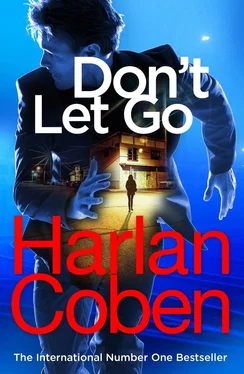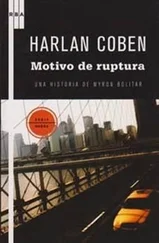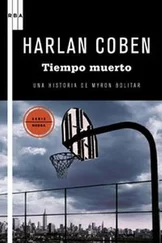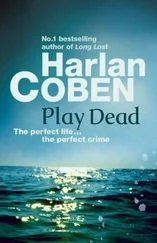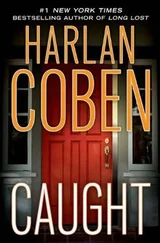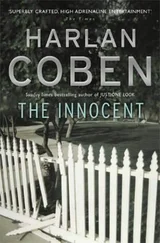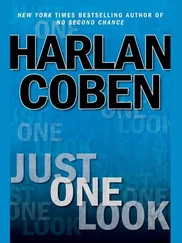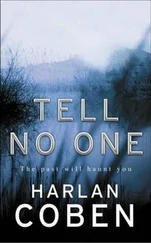Should I send a copy to someone else for safekeeping?
Yes. The question is, who? I consider David Rainiv, but if it ever got traced back — and, yes, I’m being paranoid — I don’t want to put him in danger. I think about sending it to Ellie, but same issue. Plus I need to think it through. I need to really consider my next move with her.
The obvious answer is Augie, but again, do I want to just send this out to his computer without any kind of warning?
I call Augie on the phone.
“You at the Rusty Nail yet?” Augie asks.
“On my way. I’m emailing you a video.”
I fill him in on David Rainiv’s visit and the rest of it. He stays quiet. When I finish, I ask if he’s still on the line.
“Don’t send it to my work,” he says.
“Okay.”
“You got my personal email address?”
“Yes.”
“Okay, send it there.” There is a longer pause. Then Augie clears his throat and says, “Diana... you said she wasn’t on the tape?”
I can always hear it when he says Diana’s name. I lost you. A brother. A twin. Devastating, sure. But Augie lost his only child. Whenever he says Diana’s name, it comes out hoarse, pained, like someone is pummeling him as he speaks. Each syllable rains down new hurt.
“I didn’t see or hear Diana,” I tell him, “but the tape isn’t great quality. You might pick up something I didn’t.”
“I still think you’re heading down the wrong path.”
I think about that. “I do too.”
“So?”
“So it’s the only path I have right now. I might as well stay on it and see where it leads.”
“Sounds like a plan.”
“Though not a good one.”
“No, not a good one,” Augie agrees.
“What did you tell Andy Reeves?” I ask.
“About you?”
“About my reason for visiting, yeah.”
“Not a damn thing. What could I tell him? I don’t even know.”
“Part of my plan,” I say. “The not-good one.”
“Better than none at all, I guess. I’m going to watch the tape. I’ll call you if I see anything.”
The Rusty Nail is a converted house with cedar-shake vinyl siding and a red door. I park between a yellow Ford Mustang with the license plate EBNY-IVRY and a bus-van hybrid with the words “Bergen County Senior Center” painted on the side. I don’t know what Augie meant by saying it used to be a dive bar. From the outside it still looks like one to me. The only change I notice is the extensive wheelchair ramp. That didn’t used to be there. I head up the steps and open the heavy red door.
Initial observation: The crowd is old.
Very old. I’m guessing the median age is close to eighty. Probably came in from the senior center. Interesting. Seniors take field trips to supermarkets and racetracks and casinos.
Why not taverns?
The second thing I notice: There is an ostentatious white piano with silver trim, like something Liberace would have considered too garish, in the middle of the room, complete with a tip jar. Straight out of Billy Joel. I almost expect a real estate novelist and Davy from the navy to be nursing drinks. But I don’t see anyone fitting that description. I see a variety of walkers and canes and wheelchairs.
The piano player is pounding out “Sweet Caroline.” “Sweet Caroline” has become one of those songs, played at every wedding and sporting event, beloved by children and seniors alike. The old patrons sing along enthusiastically. They are off-key and have no pitch and don’t care. It’s a nice scene.
I’m not sure which one is Andy Reeves. In my head, I’m expecting someone in his midsixties with a crew cut and military bearing. A few of the older men fit the bill, I guess. I step into the room. I spot several strong young guys now, their eyes moving around like wary security guards, and I’m tagging them as bartenders or maybe orderlies for the seniors.
The piano player looks up and nods at me. He does not have a crew cut or military bearing. He has feathered blond hair and that kind of waxy complexion I associate with chemical peels. He beckons with a head gesture for me to take a seat at the piano as the older crowd builds to a giant “Bah-bah-bah, good times never seemed so good.”
“So good, so good, so good...”
I sit. One of the old guys throws his arm around me, nudging me to sing along. I join in for a very unenthusiastic “I’ve been inclined” and wait for someone else — preferably Andy Reeves — to approach me. No one does. I glance around the room. There is a poster featuring four of the happiest, healthiest seniors this side of a Viagra ad with the words “Tuesday Afternoon Bingo — $3 Drinks” emblazoned across their chests. At the bar, a few of the guys I figure are orderlies-bartenders pour a red beverage into laid-out plastic cups.
When “Sweet Caroline” finishes up, the old folks hoot and holler their approval. I’m almost looking forward to the next song, enjoying this quasi normalcy, but the feathered-hair piano man stands up and announces a “quick break.”
The old-timers register their disappointment with gusto.
“Five minutes,” the piano man says. “Your drinks are at the bar. Think up a few requests, okay?”
That placates them a bit. The piano man scoops the money out of what looks like an oversized brandy snifter, heads toward me, and says, “Officer Dumas?”
I nod.
“I’m Andy Reeves.”
First thing I notice: His speaking voice is a little breathy.
Or whispery.
He takes the seat next to me. I try to guess the age. Even with whatever weird cosmetic work has made his face shiny, he can’t be more than midfifties, but then again, the military base closed down only fifteen years ago. Why does he have to be older than that?
I glance around. “This place,” I say.
“What about it?”
“It seems a far distance from the Department of Agriculture.”
“I know, right?” He spreads his hands. “What can I say? I needed a change.”
“So you no longer work for the government?”
“I retired, what, seven years ago. Worked for the USDA for twenty-five years. Got a nice pension and now I’m pursuing my passion.”
“Piano.”
“Yes. I mean, not here. This is, well, you have to start somewhere, right?”
I study his face. The tan is from a bottle or bed, not the sun. I can see some very pale skin near the hairline. “Right,” I say.
“We had a piano at that old Westbridge office. I used to play there all the time. Helped us relax when the job got too stressful.” Reeves shifts in his seat and flashes teeth so big and dazzlingly white that they could double as piano keys. “So what can I do for you, Detective?”
I jump right in. “What kind of work were you guys doing at the military base?”
“Military base?”
“That’s what it used to be,” I say. “A control center for Nike missiles.”
“Oh, I know.” He shakes his head in awe. “What a history that place has, am I right?”
I say nothing.
“But all of that, well, it was years before we moved in. We were just an office complex, not a military base.”
“An office complex for the USDA,” I say.
“That’s right. Our mission was to provide leadership on food, agriculture, natural resources, rural development, nutrition, and related issues based on sound public policy, the best available science, and efficient management.”
It sounds rehearsed, probably because it is.
“Why there?” I ask.
“Pardon?”
“The USDA has an office on Independence Avenue in Washington, DC.”
“Headquarters, sure. We were a satellite.”
“But why there, in the woods like that?”
“Why not?” he says, lifting his palms to the ceiling. “It was a great space. Some of the work we did, well, I don’t want to boast or make it sound more glamorous than it was, but many of our studies were absolutely top secret.” He leans forward. “Did you ever see the movie Trading Places ?”
Читать дальше
